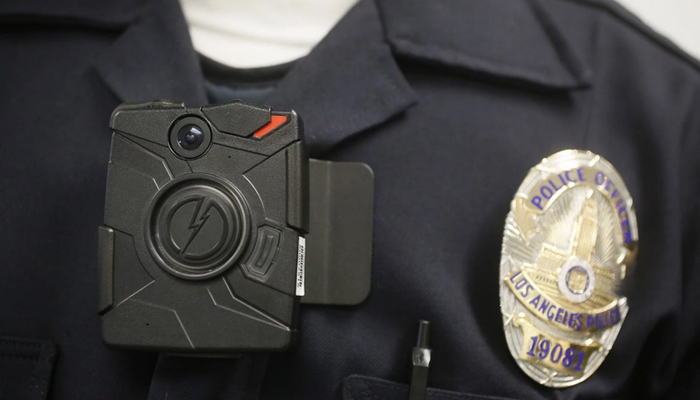(单词翻译:单击)
听力文本
This is Scientific American — 60-Second Science. I'm Erika Beras.
Got a minute?
The last few years have seen numerous widely publicized incidents of civilians, black men in particular, being killed by police. In response, many officers are now required to wear body cameras. The theory is that technology will lessen the likelihood of an officer using unnecessary force to diffuse a situation. Now research finds that body cameras do indeed appear to keep encounters between police and civilians from intensifying to the point where a civilian files a complaint–in a few jurisdictions, anyway.
The study is in the journal Criminal Justice and Behavior.
Researchers collected data from seven police departments in the U.K. and the U.S. that serve a total population of two million people. The data represented over 1.4 million hours logged by nearly 2,000 police officers in 2014 and 2015.

Officers were randomly assigned to either wear or not wear body cameras week by week. When the police wore the cameras they were required to have them on at all times.
The year before the study, a total of 1,539 complaints were filed against officers at the seven sites. But during the course of the body camera experiment, a total of just 113 complaints were filed—a reduction of 93 percent. Six of the seven sites saw complaint reductions of at least 88 percent.
An interesting finding was that complaints against officers wearing body cameras were almost equal to complaints against those who were not wearing the cameras. The study's authors suggest that the change in police behavior from wearing the camera continued even after the camera was removed. This effect is called "contagious accountability": all officers became more conscious of their actions—camera or no camera.
Thanks for the minute for Scientific American — 60-Second Science Science. I'm Erika Beras.
参考译文
这里是科学美国人——60秒科学。我是艾丽卡·贝拉斯。
有一分钟时间吗?
最近几年发生了多起广为人知的平民被警方击毙事件,特别是黑人被警察击毙事件。事出之后,许多警察都被要求配备随身相机。原理是,这项技术会减少警察在控制局势时使用不必要武力的可能性。现在,研究发现,随身相机似乎确实可以避免警察和平民之间的冲突激化到平民向管辖机关投诉的地步。
这一研究结果发表在《刑事审判与犯罪行为》期刊上。
研究人员收集了英国和美国七个警察部门的数据,这些部门总共为200万人提供服务。这些数据展示了2014年和2015年2000名警察140万个小时的执法记录。
这些警察每周被随机指派配备随身相机或不配备随身相机。当警察配备随身相机时,他们要一直开着相机。
在研究开始的前一年,七个警察部门共收到了1539起投诉。但是,在警察配备随身相机期间,仅有113起投诉,投诉减少了93%。七个警察部门中有6个部门的投诉至少减少了88%。
一个有趣的发现是,对配备随身相机警察的投诉几乎和对没有配备随身相机警察的投诉相同。这项研究的作者建议,警察行为因配备随身相机而改变,那在取消随身相机后,这种改变也应该持续下去。这种效应被称为“传染性问责”:无论有没有配备随身相机,所有警察都应更加注意自己的行为。
谢谢大家收听科学美国人——60秒科学。我是艾丽卡·贝拉斯。
译文为可可英语翻译,未经授权请勿转载!
重点讲解
重点讲解:
1. in particular 尤其;特别;
例句:In particular, overseas sales increased by about 10 percent.
特别是海外销售大约增长了10%。
2. in response 回复;回答;回应;
例句:In response, the bank stopped the project and consulted the foundation about how to restore the building.
银行的反应是中止这项工程,并与基金会进行协商,讨论如何恢复大楼的原貌。
3. be equal to 同样的;相等的;
例句:It is equal to me whether he comes or not.
他来不来对我都一样。
4. be conscious of (尤指由于不满或自觉重要而)注意的,关注的;
例句:I'm very conscious of my weight.
我很在意自己的体重。


